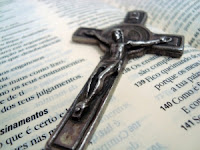Contrary To What You Think, Legalists Do Not Have A High View Of The Law
Several years ago I received the criticism from some parishioners (former now), that I was preaching and teaching with a low view of the Law. The criticism was that I was weak on the Law and too heavy on the Gospel. In response to their criticism, I can recall sharing that their confusion came not over my supposed weak view of the Law, but rather my strong view of the Law. In other words, I had a much stronger view of the Law than they did, which resulted in them believing that I was weak on the Law. Confused? Yes, they were unfortunately confused too.
J. Gresham Machen counterintutively states that “A low view of law always produces legalism; a high view of law makes a person a seeker after grace.”
There is no doubt about it that Machen's statement is counterintutive. Let's have Tullian Tchividjian expound on this a bit more,
"The reason this seems so counter-intuitive is because most people think that those who talk a lot about grace have a low view of God’s law (hence, the regular charge of antinomianism). Others think that those with a high view of the law are the legalists. But Machen makes the very compelling point that it’s a low view of the law that produces legalism because a low view of the law causes us to conclude that we can do it–the bar is low enough for us to jump over. A low view of the law makes us think that the standards are attainable, the goals are reachable, the demands are doable. It’s this low view of the law that caused Immanuel Kant to conclude that “ought implies can.” That is, to say that I ought to do something is to imply logically that I am able to do it.
A high view of the law, however, demolishes all notions that we can do it–it exterminates all attempts at self-sufficient moral endeavor. We’ll always maintain a posture of suspicion regarding the radicality of unconditional grace as long as we think we have the capacity to pull it off. Only an inflexible picture of what God demands is able to penetrate the depth of our need and convince us that we never outgrow our need for grace–that grace never gets overplayed. “Our helplessness before the totality of Divine expectation is what creates the space for God’s amazing grace and the freedom it produces.” The way of God’s grace becomes absolutely indispensable because the way of God’s law is absolutely inflexible.
So a high view of law equals a high view of grace. A low view of law equals a low view of grace."I wholeheartedly agree with Tullian in his assessment. However, there is also another possibility that can lend to this same confusion. The other possibility is not a low view of the Law, but an overly high view of mankind. In other words, in order to obtain righteousness by the way of mankind, we only have two options: 1) We weaken the Law so that we can obtain and fulfill it. (as stated by Machen and Tullian above) OR 2) We increase and inflate the abilities of mankind so that mankind can, in theory, obtain and fulfill the Law. Either way, we are manipulating God's Law and thus diminishing our need for the Gospel.

Think about the implication of this. What happens to the person of Christ when we have a 'high' view of mankind? What happens to the person of Christ when we have a 'low' view of mankind?
A High View Of Man Leads To A Low View of Christ:
When we fail to clearly see or underestimate the depravity of mankind, the person of Christ suffers. What kind of savior is needed if mankind is only hindered or struggling? If mankind is viewed as basically good with some bad habits then Jesus becomes a helper or better yet... a life coach. Jesus is reduced to our Christian mascot who cheers us on as we attempt to overcome our inefficiencies
A Low View Of Man Leads To A High View Of Christ
When we assess mankind in light of the scriptures we will come to see that mankind's nature is always much darker than we usually believe it to be. True, mankind is created in the image of God! However, the fall of mankind in Genesis 3 marred the image making man not "mostly dead" in sin but "dead-dead" in sin. A mere life coach or helper are not sufficient with this view of man. Rather an all-power, all-knowing, sufficient savior is needed to deliver mankind from their sin and their body of death.
My friends, may we continue to learn and ponder God's holy Law in its full force and purity. As the Law is exalted in our midst, may God's Gospel be ever more exalted, for our forgiveness of sins and hope.
(CLICK HERE for a diagram on this subject.)
To join in the conversation on Facebook, CLICK HERE.
Follow on Twitter, CLICK HERE.
To join in the conversation on Facebook, CLICK HERE.
Follow on Twitter, CLICK HERE.




Comments